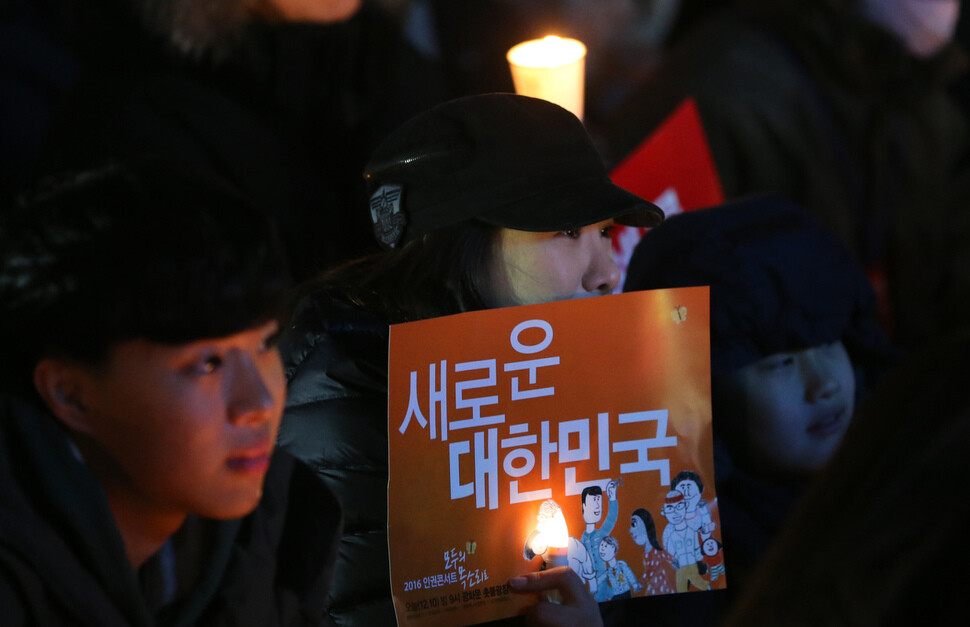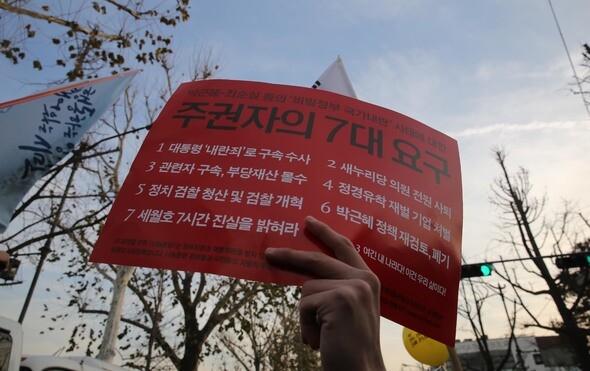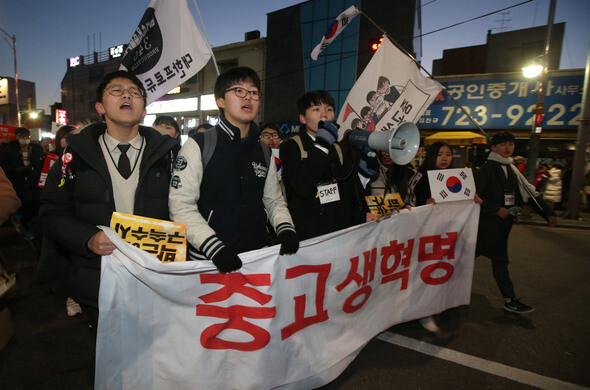hankyoreh
Links to other country sites 다른 나라 사이트 링크
Citizens become the think tanks amid calls for various reforms

The chief driving force behind the “November candlelight revolution” was the public’s anger toward President Park Geun-hye and her associates. It was a rage rooted in experiences with widespread inequality and oppression in daily life. With their calls for Park’s resignation, the ordinary people who took to Gwanghwamun Square to demonstrate brought to the surface a range of issues experienced directly and indirectly in South Korean society, from the preferential treatment extended to Jung Yu-ra in her university admission to the politicization of the prosecutors and government-business collusion. Now that Park has been impeached, the candle-carrying public’s attention is likely to turn to these areas for reform.
Issues emerging in the square
Perhaps the biggest demand coming from citizens has been for chaebol reform and an end to government-business collusion.
“We have to change this structure of polarization, where it’s only the rich who get richer,” said Kim Myeong-rye, a 44-year-old participant in last weekend’s candlelight demonstration. “We have to be able to monitor the chaebol and the state when they collude to commit corruption.”
Other calls included demands for reforms to the prosecutors, who many see as stirring up government disorder by openly conspiring with politicians, and the introduction of a fairer system for young people to prevent the privileged - a group popularly referred to as the “gold spoons” - from enjoying preferential treatment. Many voiced anger at the fruits of the public’s labor in the national pension being misused as a means of transferring chaebol management authority. Another participant denounced the media for being too submissive to power and neglecting its monitoring role.
“If the media had been doing a good job monitoring things from the beginning, none of this would have happened,” he said.
Politicians and others have been responding in different ways to the outpouring of sentiments. Civic group Public Pension for All and the Korean Confederation of Trade Unions lodged a criminal complaint last month against National Pension Service Chairman and CEO Moon Hyung-pyo. On Dec. 14, some 12,000 citizen petitioners assembled to demand the state file a class action suit for damages. The KBS network’s labor union launched a strike. Meanwhile, politicians have spoken openly about chaebol and prosecutorial reform. Minjoo Party lawmaker Park Ju-min recently sponsored an amendment to the Public Prosecutor’s Act that would institute national elections for local prosecutors’ office heads, while party floor leader Woo Sang-ho declared he would “push for the dissolution of the Federation of Korean Industries, which has been used as an instrument for government-business collusion.”

“Today, citizens are the think tanks”
The reform issues are not actually anything new; most have a long history. Ideally, politicians would have taken the lead in resolving them already. Instead, their hands-off approach led to them being forced into it by the public’s calls. Many say politicians and intellectuals have failed to keep up with the agendas and ideas raised by the public’s collective wisdom.
“Today, citizens are the think tanks,” said Lee Won-jae, director of the group Cultural Action’s cultural policy research institute. “Citizens have long been making specific demands on specific issues related to their lives, including chaebol reform, abandonment of state-issued history textbooks, and withdrawal of THAAD [the Terminal High Altitude Area Defense missile defense system], but politicians in Yeouido have just bumbled around and repeated the same mistakes.” (Yeouido is the Seoul neighborhood where the National Assembly is located.)
“We need to have a variety of platforms emerge and grow so that the ideas, arguments, and demands raised by citizens can be actively shared and fine-tuned so that they can have an influence on institutional politics,” Lee argued.
As sovereigns, members of the public have realized various achievements - some minor, some large - with the novel ideas and bold drive shown over the course of the November candlelight revolution. Saenuri Party lawmaker Yi Wan-young, one of President Park Geun-hye’s staunchest defenders, resigned his secretary seat on the National Assembly’s special parliamentary audit committee to investigate the Choi Sun-sil government interference scandal on Dec. 14 after hundreds of citizens pressured him by making donations of 18 won (1.5 cents) apiece to his support account and demanding receipts (the pronunciation of the Korean word for 18 is similar to a curse word). During the hearing on Dec. 7, one internet user offered crucial real-time tips for catching former presidential Chief of Staff Kim Ki-choon in lies. Once the impeachment motion was handed over to the Constitutional Court, netizens created a “Cheer Up, Constitutional Court” website allowing visitors to send emails to individual justices.
“Over the course of the [candlelight demonstrations], South Korean citizens have learned and evolved ways of making their voices heard,” said Seoul National University professor Kim Hong-jung.

“Improve the representation system”: Calls for political reform
Demands for reform in different areas have led ultimately to calls for political reform. The Citizen Sovereignty Council, launched in the wake of the candlelight demonstration to demand direct democracy, has called for introduction of a popular initiative system.
“You can’t expect clear-cut chaebol reform or true political reform from an aristocratic National Assembly. When the legislature ignores the sovereign’s calls and focuses solely on its own games, the sovereigns need to be able to present legislative ideas based on their collective wisdom,” the group said.
On Dec. 13, Minjoo Party lawmaker Kim Byung-wook sponsored a bill to introduce a national recall system for National Assembly lawmakers, signaling a commitment to stepping up the public’s direct controls on an establishment of “representatives” who have ignored popular demands.
Election system reforms are also being discussed.
“Direct democracy isn‘t something that can function on an everyday basis. If it’s the public’s desire to change the political landscape, then that starts with reforms to the election system, which would allow us to set the representative system right,” said Ha Seung-su, co-representative of Solidarity for Proportional Democracy.
In the past, elections saw politicians focusing more on nomination battles within their own parties rather than on developing and winning voter support for effective policies and making efforts to address major tasks of South Korean society like chaebol reform.
“We need to institute an interlocking proportional representation system that assigns National Assembly seats according to party vote rates,” said Ha. “That way, parties can battle over policy instead of fighting for power within themselves.”
Another issue is a system that benefits only established parties.
“By lowering the age limit for the right to vote and be elected from 19 and 25 [respectively] and eliminating the system that has all National Assembly candidates make donations of 15 million won (US$12,700), we can lower the entry barriers and break up the establishment politics cartel,” suggested Green Party steering committee co-chair Kim Ju-on.
By Heo Seung and Park Su-ji, staff reporters
Please direct questions or comments to [english@hani.co.kr]

Editorial・opinion
![[Column] Park Geun-hye déjà vu in Yoon Suk-yeol [Column] Park Geun-hye déjà vu in Yoon Suk-yeol](https://flexible.img.hani.co.kr/flexible/normal/500/300/imgdb/original/2024/0424/651713945113788.jpg) [Column] Park Geun-hye déjà vu in Yoon Suk-yeol
[Column] Park Geun-hye déjà vu in Yoon Suk-yeol![[Editorial] New weight of N. Korea’s nuclear threats makes dialogue all the more urgent [Editorial] New weight of N. Korea’s nuclear threats makes dialogue all the more urgent](https://flexible.img.hani.co.kr/flexible/normal/500/300/imgdb/original/2024/0424/7317139454662664.jpg) [Editorial] New weight of N. Korea’s nuclear threats makes dialogue all the more urgent
[Editorial] New weight of N. Korea’s nuclear threats makes dialogue all the more urgent- [Guest essay] The real reason Korea’s new right wants to dub Rhee a founding father
- [Column] ‘Choson’: Is it time we start referring to N. Korea in its own terms?
- [Editorial] Japan’s rewriting of history with Korea has gone too far
- [Column] The president’s questionable capacity for dialogue
- [Column] Are chaebol firms just pizza pies for families to divvy up as they please?
- [Column] Has Korea, too, crossed the Rubicon on China?
- [Correspondent’s column] In Japan’s alliance with US, echoes of its past alliances with UK
- [Editorial] Does Yoon think the Korean public is wrong?
Most viewed articles
- 1‘We must say no’: Seoul defense chief on Korean, USFK involvement in hypothetical Taiwan crisis
- 2Will NewJeans end up collateral damage in internal feud at K-pop juggernaut Hybe?
- 3[Column] Park Geun-hye déjà vu in Yoon Suk-yeol
- 4Why Korea shouldn’t welcome Japan’s newly beefed up defense cooperation with US
- 5Thursday to mark start of resignations by senior doctors amid standoff with government
- 6N. Korean hackers breached 10 defense contractors in South for months, police say
- 7[Guest essay] The real reason Korea’s new right wants to dub Rhee a founding father
- 8[Column] ‘Choson’: Is it time we start referring to N. Korea in its own terms?
- 9Kim Jong-un expressed ‘satisfaction’ with nuclear counterstrike drill directed at South
- 10[Editorial] New weight of N. Korea’s nuclear threats makes dialogue all the more urgent